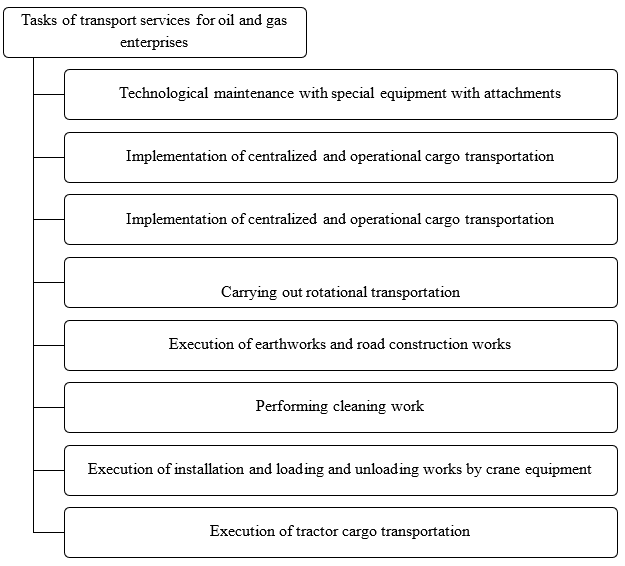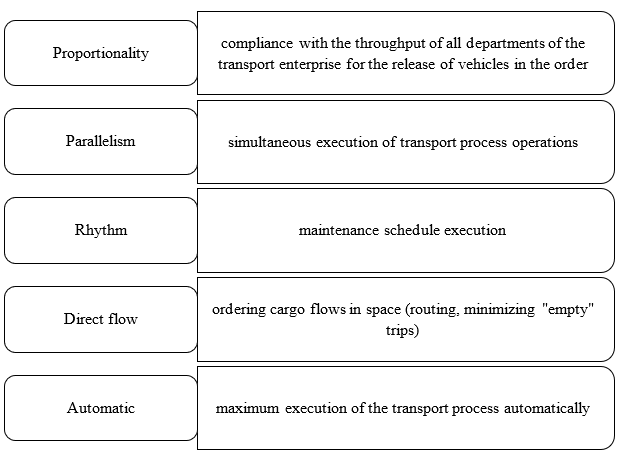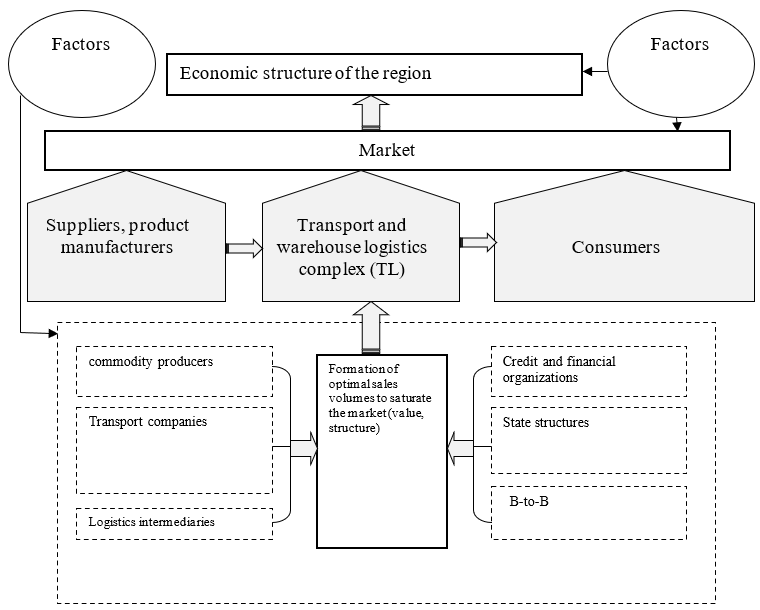Abstract
Currently, the largest number of all logistics operations within the movement of finished products from manufacturer to consumer is carried out by a variety of vehicles. The efficient operation of transport is the key to the company's profitability and customer satisfaction of the business entity. Therefore, the implementation of a variety of traffic management systems in an organization is of particular importance and relevance. In general, transport logistics implies the organization of the transportation of goods in such a way that the following are observed: the principle of economy (minimization of cost and time costs), the principle of optimization and optimal choice of a vehicle (based on the declared categories of cargo), as well as the principle of maximum customer satisfaction (delivery "exactly on time"). In general, the importance of transport logistics is due not only to the possibility of optimizing the structure of costs, but also to ensuring the functioning of an economic entity as a whole, since without transportation of goods, the implementation of entrepreneurial detail is actually limited.
Keywords: Development, economy, logistics, prospects, sector, transport complex
Introduction
Under transport, in the economic literature, it is customary to understand a complex of means of transportation, rolling stock elements, means of communication, as well as special technical devices and mechanisms that support their functioning. Transport forms the conditions for the creation of a local and national market. The optimal organization of the transport network is important, since the transport factor affects the efficiency of the enterprise, which is directly related to its viability in market conditions; the market itself involves the exchange of goods and services, in connection with which, transport is a prerequisite for the existence of the market (Almetova, 2013). In addition, transport serves to meet the need for the immediate mandatory movement of passengers and goods at all stages of the development of the economy, its individual industries, as well as the population. Thus, transport is a service industry. Market conditions highlight the timing of the movement, which is set by the customer.
Problem Statement
Optimal and efficient management of logistics transport flows in an organization remains one of the most controversial, problematic and not fully explored issues of transport logistics. Transport is an important part of the country's economy, since it is a material carrier between separate parts of the country, sectors of the economy, and specific enterprises. The formation of a transport system contributes to the specialization of regions and their integrated development. The transport factor helps to achieve an effective distribution of productive forces, since it affects the location of production, which takes into account the need for transportation, the volume of finished products, its transportability, the presence of a sufficient number of transport routes, their throughput capacity, etc.
Research Questions
In this training, the authors research efficient management of logistics transport flows in an organization remains one of the most controversial, problematic and not fully explored issues of transport logistics.
Purpose of the Study
In assembly with comparatively high development of logistics transport and transport system of federal and regional level.
Materials and Methods
The academic and working foundation of this learning stood the works of national and far-off economic expert devoted to the development of transport logistics. The data base of the learning was complete up of numerical information from the Federal State Statistics Service, the Combined Interdepartmental Data Orientation Structure, the Regional Form of the Federal Government Information Service for the Altai Area, the Siberian Customs Administration, materials of scientific and practical conferences on the problem under consideration, periodicals and special publications .The study used the following methods: abstract logical, economic and statistical, monographic, as well as methods of structure study, financial assessment, professional valuations, monetary and exact model.
Findings
The second feature of transport is that its products are the transport production process, namely the process of moving passengers and goods. In this regard, transport products are characterized by an intangible property. In addition, transport continues to manufacture products and completes it when it is delivered to the place indicated by the consumer, i.e. to the place of consumption. The receipt of the cargo, which is documented in accordance with the waybills, is the end of the production process. With regard to passenger transportation, the end of production in transport is the delivery of the passenger to a certain place. Thus, the production of transport products carried out directly during the movement of transport with a passenger or cargo.
The development of economic sectors presupposes the advancing development of transport, which means the initial construction of the entire transport infrastructure, which contributes to the "accumulation" of transport products. After that, the work of the industry begins. In the opposite situation, the produced goods cannot be moved to the sphere of consumption (Dukhno & Zemlin, 2017).
Trends in the global economy contribute to the transfer of transportation to road transport of the whole size of cargo business. Simultaneously, the use of land modes of transport, suitable for practice and branded by low costs, is relevant for Russia. This is owing to the big zone of the country, harsh usual settings and a important amount of weighty belongings transported over extensive distances.
The logistics system of any enterprise is one of the most complex mechanisms that combines a set of various interrelated elements. The functioning of this mechanism without any failures and problems depends on the effective operation of each of its constituent elements (Karamin, 2016). The methods and technologies used are the basis for the effectiveness of any mechanism. Modern processes of integration, informatization and digitalization have significantly expanded the production capabilities of economic entities. Many modern organizations pay special attention to the diversity of the product range, which leads to the need to create specialized storage areas (warehouses) and affects the growth of the company's turnover. The expansion under consideration increases the importance and relevance of logistics systems in the management of commercial objects in over-all, and in the management transport in particular (Chasovskoy, 2015).
Currently, most Russian and foreign organizations are actively implementing and using a variety of logistics products in the management of cargo flows. Logistics provides an opportunity to optimize commodity, financial and information flows at the enterprise, and, according to Allegri (2013) “…. significantly reduce the time interval between the purchase of raw materials and semi-finished products and the delivery of goods. Finished products for the consumer, contributes to a sharp reduction in inventory” (p. 118).
In logistics, transport acts as a link that forms a single technological chain: the movement of raw materials and materials from suppliers and intermediaries, and the subsequent direction of finished products to consumers, and is considered as a fundamental part of a single transport and production process.
Business entities, whose activities are continuously connected with the transportation process, in modern conditions, within the framework of ensuring competitiveness, cannot do without the automation of transport logistics in order to minimize costs. To achieve this, various transport management systems (TMS, Transport Management System) are actively used. The transport management system is an automated platform for logistics business processes in the field of transportation in an enterprise. The advantages of this system are:
- the possibility of planning transportation;
- execution of orders, based on the optimal load of transport;
- the ability to track and redirect flights;
- control of the transportation budget at all stages of implementation;
- calculation of transportation efficiency indicators, etc.
Transport logistics occupies a key position in the transport management system, as it has a direct impact on all stages: from planning and purchasing the necessary materials to managing the product life cycle. Within the framework of maximum transparency, which is achieved through the organization of an effective transport management system, transportation planning and execution are carried out as quickly and economically as possible, which, accordingly, leads to increased customer satisfaction and positive financial results of the company. In general, a transport management system should be considered as a logistics platform that allows enterprises to plan, execute and optimize the physical movement of goods, both inbound and outbound, as well as ensure that the supply meets the requirements and has the necessary documentation. At the same time, an important aspect of the implementation of an automated system is the possibility of its integration with the enterprise accounting system, taking into account specific industry features (Sabaeva, 2020). So, in Figure 1, the system of transport services for enterprises is presented on the example of the oil and gas industry.

The organization of transport services at enterprises is carried out in accordance with the general principles of the organization of production, however, they are differentiated by industry sectors of the economy and are characterized by their own characteristics (Figure 2).

Natural and climatic conditions and the level of economic development of the region have a important influence on the development of transport logistics and the level of road superficial illness. So, in the Altai Territory, the share of the length of public roads of local importance that do not meet regulatory requirements in the total length of public roads of local importance is on average from 10 to 90%. In some areas, this figure exceeds 90%, which significantly affects the level and quality of cargo flows. In the structure of cargo transportation, coke has the largest share (55%), agricultural products (25%) and timber (10%) (Official website of the Department of the Federal State Statistics Service for the Altai Territory and the Republic of Altai: electron. text. data, 2021).
For the effective functioning of the logistics infrastructure for the Altai Territory, as a cross-border region, it is advisable to consider the creation of logistics complexes as transport hubs, which can be considered as the most important condition for the prospective development of not only international trade, but international integration and cooperation of the countries of the Far and Near Abroad. At the same time, not only the transportation of goods is important, but also warehousing, packaging and cargo handling (Figure 3).
The creation of a transport and logistics complex can solve the problem of providing services for the management of transport and warehouse processes. For example, the transport hub of the Rubtsovsk zone - Ust-Kamenogorsk (Republic of Kazakhstan) and the transport hub of Kulunda-Pavlodar (Republic of Kazakhstan) will optimize commodity and raw material flows to the republics of Central Asia and the Middle East.

Conclusion
The proposed transport and warehouse logistics complex includes a level participation (commodity producers, transport companies, logistics intermediaries) in logistics transportation. In addition, the development of digital services will optimize a number of procedures involving government agencies, financial institutions and commercial intermediaries.
References
Allegri, T. (2013). Transportno-skladskie raboty [Transport and warehouse work]. Per. from English. Trubin Yu. K. Mashinostroenie.
Almetova, Z. V. (2013). Transportnaya infrastruktura [Transport infrastructure]: textbook. ed. IS HE. Larina. Publishing Center of SUSU.
Chasovskoy, E. G. (2015). The concept and essence of logistics. Science today: theoretical and practical aspects. International scientific and practical conference. Scientific center "Olympus".
Dukhno, A. I., & Zemlin N. A. (2017). Transport law. General part: textbook. Law Institute of MIIT.
Karamin, V. M. (2016). Problems of transport logistics in Russia. Economic sciences, 57(3).
Kovaleva, I. V., & Kucherenko, T. V. (2019). Theoretical and methodological approach to the formation of local markets in rural areas as a fundamental characteristic of the development of an agro-oriented region. International Journal of Humanities and Natural Sciences, 4(1-3), 173-177.
Naimanova, A. S. (2020). Features of the organization of transport services for oil and gas producing enterprises. Text: direct. Young scientist, 1(291), 101-104. https://moluch.ru/archive/291/65968/
Official website of the Department of the Federal State Statistics Service for the Altai Territory and the Republic of Altai: electron. text. data. (2021). Retrieved on 17 February, 2022 from https://akstat.gks.ru
Sabaeva, D. A. (2020). Enterprise Transport Logistics Automation System. Beneficiary, 74, 10-12.
Copyright information

This work is licensed under a Creative Commons Attribution-NonCommercial-NoDerivatives 4.0 International License.
About this article
Publication Date
29 August 2022
Article Doi
eBook ISBN
978-1-80296-126-3
Publisher
European Publisher
Volume
127
Print ISBN (optional)
-
Edition Number
1st Edition
Pages
1-496
Subjects
Economics, social trends, sustainability, modern society, behavioural sciences, education
Cite this article as:
Kovaleva, I. V. (2022). Development Of Transportation And Logistics Activities In The Economy Industry Sector. In I. Kovalev, & A. Voroshilova (Eds.), Economic and Social Trends for Sustainability of Modern Society (ICEST-III 2022), vol 127. European Proceedings of Social and Behavioural Sciences (pp. 250-257). European Publisher. https://doi.org/10.15405/epsbs.2022.08.28

